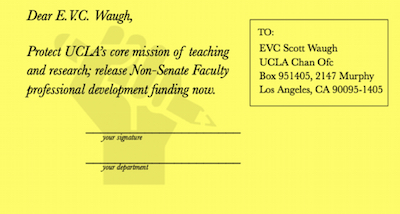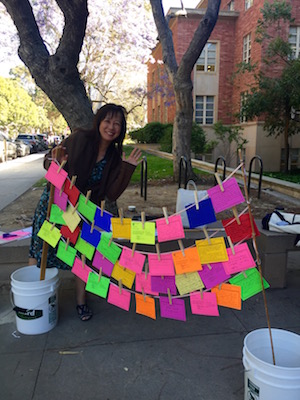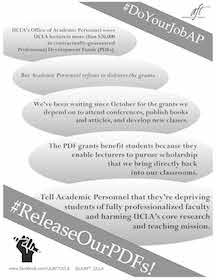UC-AFT Secures Professional Development Funding At UCLA
I’m thrilled to report on a recent union victory at UCLA, with an outcome that shows how much we can accomplish when we join together to exercise our rights.
 One of our union’s biggest accomplishments has been negotiating the right to Professional Development Funds (PDFs) exclusively for lecturers and other non-Senate faculty. Awarded annually, these grants enable us to attend conferences, publish books and articles, and develop new classes that incorporate advancements in our fields of expertise. UC-AFT is ahead of the curve here, having already achieved what some academic organizations are beginning to recommend: professional development resources for all faculty, so that all faculty can play a properly scholarly role in the universities at which they teach.
One of our union’s biggest accomplishments has been negotiating the right to Professional Development Funds (PDFs) exclusively for lecturers and other non-Senate faculty. Awarded annually, these grants enable us to attend conferences, publish books and articles, and develop new classes that incorporate advancements in our fields of expertise. UC-AFT is ahead of the curve here, having already achieved what some academic organizations are beginning to recommend: professional development resources for all faculty, so that all faculty can play a properly scholarly role in the universities at which they teach.
The PDF awards process typically works smoothly year after year on all UC campuses—except at UCLA. Lecturers and NSF nominate our peers to serve on a committee of five volunteers who assess our proposals. We forward our nominations to the UCLA Academic Personnel Office, which formally convenes the committee. This year, Academic Personnel refused to accept our nominees and convene the 2015-2016 committee. And without a committee, no applications could be submitted, no grants disbursed.
Here are the steps we took to win back our PDF grants:
 First, we had informal discussions with Academic Personnel. When nothing came of those, we filed grievances to formally address the problem. Several member activists, including officers on our Local 1990 executive board, emailed the Vice Chancellor for Academic Personnel personally to let her know what was happening in the office she oversees. When we didn’t get a substantive response, our members circulated a petition, ultimately gathering about 60 signatures that a delegation of lecturers and allies delivered to the Vice Chancellor’s office in person. In our next grievance meeting, it was clear that representatives from Academic Personnel had read the petition and been swayed by it, but the settlement they offered was not favorable enough for us to seriously contemplate.
First, we had informal discussions with Academic Personnel. When nothing came of those, we filed grievances to formally address the problem. Several member activists, including officers on our Local 1990 executive board, emailed the Vice Chancellor for Academic Personnel personally to let her know what was happening in the office she oversees. When we didn’t get a substantive response, our members circulated a petition, ultimately gathering about 60 signatures that a delegation of lecturers and allies delivered to the Vice Chancellor’s office in person. In our next grievance meeting, it was clear that representatives from Academic Personnel had read the petition and been swayed by it, but the settlement they offered was not favorable enough for us to seriously contemplate.
Instead of giving in and giving up, we organized. One of our members suggested escalating our campaign with postcards. (In the past, UC librarians conducted a successful postcard campaign during contract bargaining.) Our activists planned for the postcards to serve three purposes at once: 1) We could engage more members to express how important the PDF grants are to our research and teaching. 2) We could display them outside the administration building where representatives from UC-AFT, UCLA admin, and the UC Office of the President would be present at a grievance resolution meeting. 3) We could mail them to UCLA’s Executive Vice Chancellor and Provost, who is largely responsible for the campus’s day-to-day operations.
Ultimately we gathered more than 100 brightly-colored postcards written by lecturers, demonstration teachers, librarians, students, alumni, and other allies from across the UC system. We stressed how important our PDF grants are for faculty who are often excluded from other funding opportunities. We said how deeply we rely on our PDFs to participate in the core research and teaching missions of the UC. We emphasized that these grants enable us to communicate our expertise around the world and bring the world back into our classrooms.
On the day of the grievance resolution meeting, we set up a table outdoors. We hung the postcards on ribbons, passed out flyers to students, and engaged people entering and leaving the admin building to talk about the situation. In the meeting itself, we made our own settlement offer. Labor Relations countered with a proposal that would have made recruiting PDF committee members more difficult going forward. We rejected their proposed settlement for the second time. UCLA_ReleasePDF_flyer_2016.pdf
We left that meeting thinking about our next steps and were still brainstorming when, later that week, we received great news. UCLA Labor Relations made a third settlement offer, this one extremely favorable, in which they agreed to convene the 2015-2016 PDF committee immediately. We accepted.
 Why was our campaign successful? Partly because we had previously bargained good, strong contract language that protected us. Partly because our efforts attracted the attention of the student newspaper, the Daily Bruin, which interviewed our activists and published a front page article above the fold. Partly because we used social media, posting regularly on Facebook and Twitter with #DoYourJobAP and #ReleaseOurPDFs to let the UCLA community know its faculty were being shortchanged.
Why was our campaign successful? Partly because we had previously bargained good, strong contract language that protected us. Partly because our efforts attracted the attention of the student newspaper, the Daily Bruin, which interviewed our activists and published a front page article above the fold. Partly because we used social media, posting regularly on Facebook and Twitter with #DoYourJobAP and #ReleaseOurPDFs to let the UCLA community know its faculty were being shortchanged.
But mainly, we succeeded because so many of our members felt they had a stake in the fight and were willing to stand up and defend themselves instead of accepting a sub-par settlement. Armed with the conviction that we were calling on UCLA admin to do the right thing, something that benefited not just us but our students and UCLA as a whole, our activists made powerful demands for educational equity. As more and more people joined us to take part in our actions, we gained confidence that our voices would be heard. They were, because we refused to back down. And now we can get back to the scholarly work our PDFs enable.
Mia McIver
President, UC-AFT Local 1990 UCLA
Vice President for Organizing, elect
- Log in to post comments

